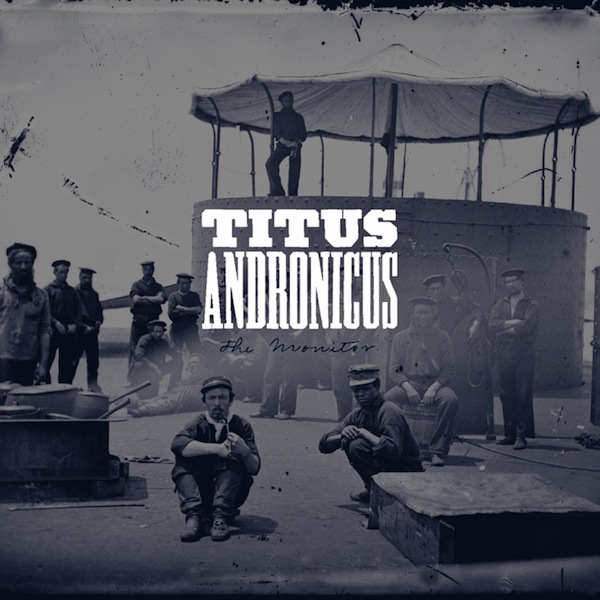Titus Andronicus had a great start. Their boozy, literary rock ‘n’ roll quickly picked them up a Pitchfork ‘Best New Music’ tag for their debut album, The Airing of Grievances. Song titles like “Albert Camus” and “Upon Viewing Bruegel’s ‘Landscape with the Fall of Icarus'” showed they had more on their minds than the average garage punk slob, even if it still came down to a bunch of dudes shouting “your life is over.” Overall, it was an impressive debut which saw them poised to go on to even bigger and better things. All they needed to do next was take the template of their debut and tighten it up a little. Get some more musical snarl to match the lyrical one and try and curtail some of their more breathless lyrics excesses.
Enter The Monitor, a concept album about the Civil War that runs for 65 minutes. Or at least, about the Civil War as some sort of metaphor about conflict within the national consciousness and personal relationships and Jesus Christ, dudes, lighten up for a second! So take a deep breath. You’re going to need it. There’s a lot to get through here; half these 10 tracks go over seven minutes, and the closer “The Battle of Hampton Roads” is twice that length. I double-standard this stuff all the time, but while I can sit and get lost in techno that goes on for hours, it’s the very rare rock record that can sustain itself over a running time this, well, this bloated. But the first thing that hits you about this record is not the length, but the vocal similarities. A few minutes into the record and you can’t get it out of your head; this sounds like Desparecidos or early, messy Bright Eyes. Last time they were beset with Springsteen comparisons (not something they’re running from when they’re trotting out a line like “tramps like us, baby we were born to die” less than two minutes in), but this time it’s all Oberstian gasp and drama. It wouldn’t necessarily be a problem; being derivative can be fine, so long as it’s in the service of good songs.
The problem with The Monitor is that the songs aren’t good enough to hold the weight of the grandiose concept. This isn’t to deny that there are great moments on the record. Oberst-o-meter aside, the first track comes roaring out of the gate in fine enough form to make you forgive the fact that it overstays its welcome by stitching a proggy couple of minutes into the middle. Even a two-minute track like “Titus Andronicus Forever,” which is a dumbass “the enemy is everywhere” gang chant over buzzing guitars and a beer-sodden solo (this is a good thing), gets derailed to make way for a spoken-word monologue (this is not a good thing). And as the record progresses, it feels like every good moment is trodden into the ground via numbing repetition or songs that meander off into the middle distance, settling into a gray haze that refuses to resolve into fire.
In their apparent eagerness to embrace the concept and make an important record, everything seems to collapse under the surrounding baggage. By the time you have spoken-word interludes featuring Craig Finn as Walt Whitman and Vivian Girls’ Cassie Ramone as Jefferson Davis, it feels like they’re piling what-the-fuck moments on top of each other in a bizarre game of concept album chicken. And the further I trudge through the album, the more I realise that I don’t need a full hour-plus of this. It’s exhausting to listen to Stickles panting out his lines while the music crashes through a series of grubby crescendos, straining towards transcendence by trying to imbue every moment with meaning. It’s frustrating, because moments do pop up out of the fug, like in “Richard II” when he sings “There’s only one dream I keep close / And it’s the one with my hand at your throat” and the music explodes behind him, the guitar writing fire on the sky. But then it fades back to Stickles, all sloppy-mouthed and rhyming “a pig in feces” with “demise of our species” and the next time that blast of guitar comes round it doesn’t feel quite so good. And so it goes, these brief moments of catharsis (the middle, climactic section of “A Pot In Which To Piss”) being swallowed by bigger moments of frustration (the unnecessary build-up and outro on the same goddamn song) until it all becomes a struggle to slog through. Trimming and tightening would have worked wonders; keeping the hooks and compacting them into songs that soared rather than being dragged down. And given what they’re capable of lyrically, a line like “all I want for Christmas is no feelings” should have been left on the cutting room floor.
On their debut, they sang “no more indie rock,” and by the time that mammoth closing track rolls around, I start wishing that “no more indie rock” was a promise they’d kept. On The Monitor, Titus Andronicus come across like the drunk at the end of the bar, all beer breath in your face, shouting at you over the music about how “the album is 65 minutes long because the Civil War ended in 1865, you know what I mean?” Chalk it up to aesthetic differences if you want. Me, I prefer my drunks to play it short and sloppy, puking up fuzz before stumbling off the stage after half an hour (see: The Oblivians, The Coachwhips, The Gories). However, if you’re more tolerant than I am, and your definition of barroom scuzz can stretch to incorporate 14-minute epics, a drunken orchestra being booed off the stage, too many fiddle solos and Craig Finn as Walt Whitman, then these drunks might give you the night of your life.

